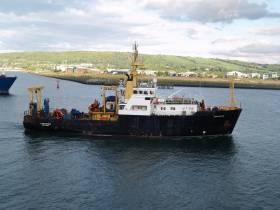Displaying items by tag: NIreland fishery survey ship
#FishingBrexit - Northern Ireland’s fishery and marine science research vessel RV Corystes (1988/1,280grt) is an unusual caller to Cork Dockyard having arrived mid-month from the ship’s homeport of Belfast, writes Jehan Ashmore.
The UK flagged RV Corystes has been monitored by Afloat since arrival however the ship is scheduled to depart Cork Harbour this weekend.
RV Corystes was in 2005 transferred from CEFAS (see below) duties in the North Sea to Northern Ireland’s Department of Agriculture and Rural Development (DARD). In the following year the Agri-Food & Biosciences Institute (AFBI) was created and joined the Science Service of DARD (now DAERA) with the Agricultural Research Institute of Northern Ireland (ARINI).
Currently, the UK as a member state of the EU is one of several countries including Ireland that are part of the Common Fisheries Policy (CFP) which operates to a restrictive licensing scheme. This enables the UK to meet important obligations under the CFP: that is the management of the fishing opportunities allocated to the UK fleet, and secondly the management of the overall fleet structure.
In the existing climate of Brexit negotiations, in which the UK are to leave the CFP, the issue has been raised by the Irish fishing industry which has major concerns. In addition to how both fishing fleets from either jurisdiction will be handled given unresolved contentious waters along the border.
The UK has the largest fishing waters within the EU followed by Ireland in which the State is allocated 4% of the total fish quota. However with the UK to depart the CFP, this will notably have an impact on the Republic’s fishing fleet which will no longer be permitted to operate within UK waters, plus forcing other EU member states to use Irish waters leading to further pressing issues.
DAERA through the AFBI owns and operates RV Corystes to a year round capability. This enables AFBI to pursue an integrated marine science programme in coastal waters within Northern Ireland, the Irish Sea and adjacent sea areas.
The vessel’s versatile platform provides opportunities to conduct a wide range of fisheries and marine environmental research to be undertaken.
AFBI also employs RV Corystes in direct support of the policy objectives of the DAERA fishery customer. They combined with a wide range of other customers, including DEFRA, the Joint Nature Conservation Committee and the European Commission.
The integrated marine science programme delivered by RV Corystes directly supports the key DAERA policy objective of sustainability of Irish Sea fisheries. This is contributing to the development of an ecosystem approach to fisheries management, as required by the European Commission.
A comprehensive data on fish stocks coupled with the marine environment provided by RV Corystes allows AFBI to investigate implications of climate change for future fisheries and on environmental policy.
As referred above RV Corystes originally served CEFAS, the Centre for Environment, Fisheries and Aquaculture Science. They based the ship out of Cefas’s homeport of Lowestoft, Suffolk.





























































